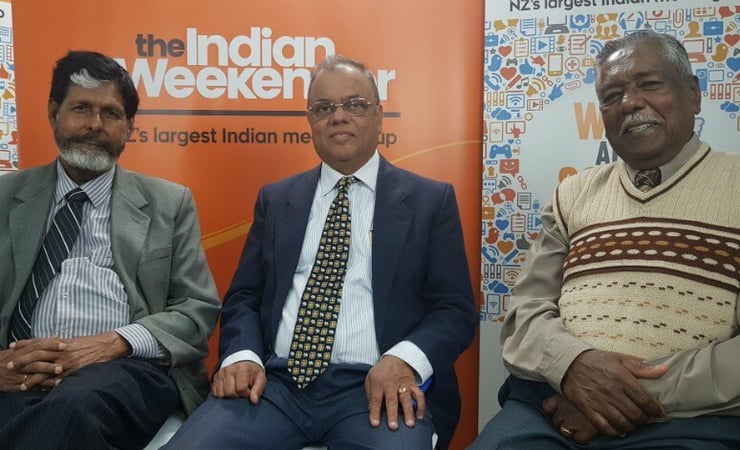Project Nasilai - Celebrating the indomitable spirit of Girmityas

The very mention of the word Girmitiya often evokes a myriad of emotions ranging from distress and pain to a sense of identity, and above all to a sense of purpose, for reconstructing and preserving a mutually-shared past.
Emotions vary, according to the perspectives that one chooses to subscribe when reconstituting the history, the legacy and the pride of the Girmitiyas.
 Girmitiyas in Fiji. Photo: Ministry of External Affairs / Government of India
Girmitiyas in Fiji. Photo: Ministry of External Affairs / Government of India
Scholars take upon themselves the task of scientifically investigating, everything related to the indenture system – an unscrupulous system, vaguely understood as Girmit in Fiji – and those who came under its grip and became christened as Girmitiyas.
The people, the communities, and the home-grown thought-leaders, who are descendants of Girmityas, and feel emotionally connected with the physical and mental torment unleashed on their forefathers in distant lands, away from home by their colonial masters, often take recourse to dwelling in the pain, and rightly so, while paying a tribute to them.
Another perspective of looking into the past of Girmitiyas is laden with fascination and echoes largely among the people who share the same ethnic and cultural identity with the descendants of Girmitiyas, that is the people of the Indian diaspora.
This piece subscribes to this third view of fascination, pride and respect toward the Girmitiyas of Fiji, and their indomitable spirit and uncovers ‘Project Nasilai’ – a collective endeavour launched by proud members of the Fiji Girmit Foundation of New Zealand a few years ago – and which deserves a place in history for doing its bit in reconstructing the past of Girmitiyas.
Legends of Nasilai
Nasilai is a small remote village on the banks of Nasilai Reef in Fiji, where a ship from India bringing in some of the earliest batches of indentured labourers from India or Girmitiyas struck with a tragedy leading to the sinking of the ship.

The relics of Syria Jahaj at the Nasilai Reef (Picture: Supplied)
The tragedy occurred on May 11, 1884, at 8.30 pm, when the ship Syria (Syria Jahaj) ran aground on Nasilai Reef leaving 59 people dead.
 The relics of Syria Jahaj at the Nasilai Reef (Picture: Supplied)
The relics of Syria Jahaj at the Nasilai Reef (Picture: Supplied)
The Nasiali tragedy had a silver lining as well, where Nasilai villagers (the native Fijians) had risked their own lives and valiantly rescued the remaining 438 passengers from the ship.

The legend of Nasilai village is deeply entrenched in the memories of almost all Fiji-Indians, as almost everyone you speak to would not only know about it but would also be emotional in recalling the experiences of their forefathers on that fateful night.
This obviously reflects the collective experience of a set of people, who have been forced into an alien environment in the South Pacific, thousands of miles away from their homes, with no opportunity to return back, and struggling to come to terms with the vagaries of life in their new environment.

Sadly, in the absence of much-written history extolling the significance of such an important event that had left a deep mark in the psychology of Fiji-Indians, people have relied on their memories to remember the experience of the first generation of settlers.
Project Nasilai: an attempt to restore history
Fiji Girmit Foundation of New Zealand took upon itself the task of ameliorating this above historical wrong and launched Project Nasilai in 2015.
The Indian Weekender is taking upon itself the task of applauding the Project Nasilai and paying a tribute to the indomitable spirit of Girmitiyas, as the 139th anniversary of Girmit Remembrance Day fast approaches.
It is important to note that every year, Fiji-Indians all around the world mark May 14, the date when the first ship bringing labourers from India arrived in Fiji in 1879 as the Girmit Day.
The Fiji Girmit Foundation of NZ, formed in 2013, had organised a pilgrimage to Nasilai village in 2015 to express collective gratitude of the Fiji-Indian community for the compassion shown by the villagers in rescuing their forefathers.
The visit happened in October 2015 and had support of the Fiji Foreign Affairs Ministry, Indian High Commission to Fiji, New Zealand High Commission to Fiji, and the Kiwi-Indian MP Kanwaljit Singh Bakshi.

Mr Bakshi had accompanied the visiting delegation of Fiji Girmit Foundation NZ which was led by Acting President Sardar Harnam Singh Golian, a former parliamentarian of Fiji, along with Viren Lal, Padmawati Charan and Thakur Ranjit Singh.
In honouring the villagers, the delegation had presented a Thanksgiving plaque, Sevusevu, and Tabua to the villagers and chiefs of Nasilai village.
The delegation of Fiji Girmit Foundation NZ along with Fiji’s Minister for Foreign Affairs, Ratu Inoke Kubuabola on 13th October 2015
It was during this visit that the delegation of Fiji Girmit Foundation of New Zealand came to know that the Nasilai villagers were going through a rough patch as one of their iconic structures – the community hall – was in the desperate situation needing urgent repairs.  The Community Hall in Nasilai village after the repair
The Community Hall in Nasilai village after the repair
For the uninitiated, the community hall has great social significance in the native Fijian society around which day to day lives of villagers revolve – a fact fully comprehended by the members of the visiting delegation who took upon themselves the task of facilitating the repair work.
 The Community Hall in Nasilai village after the repair
The Community Hall in Nasilai village after the repair
The delegation returned to NZ with a renewed vigour to find means and resources within the broader Fiji-Indian community and other like-minded stakeholders in governments and beyond to facilitate repair work of the community hall of Nasilai village.
The period following that involved intense and dedicated action from the members of Girmit Foundation, generous donors and supporters for the cause, architects, project managers, and the Fiji-Indian people residing in Fiji, who came together to complete the repair of the meeting hall, along with building new toilets and a kitchen.
The spirit of compassion and goodwill generated since then has continued ever since between the Nasilai villagers and people of Fiji Girmit Foundation NZ along with the broader Fiji-Indian community.
Project Nasilai has successfully done its bit in restoring and reclaiming a part of the much-cherished history of the Girmitiyas.




